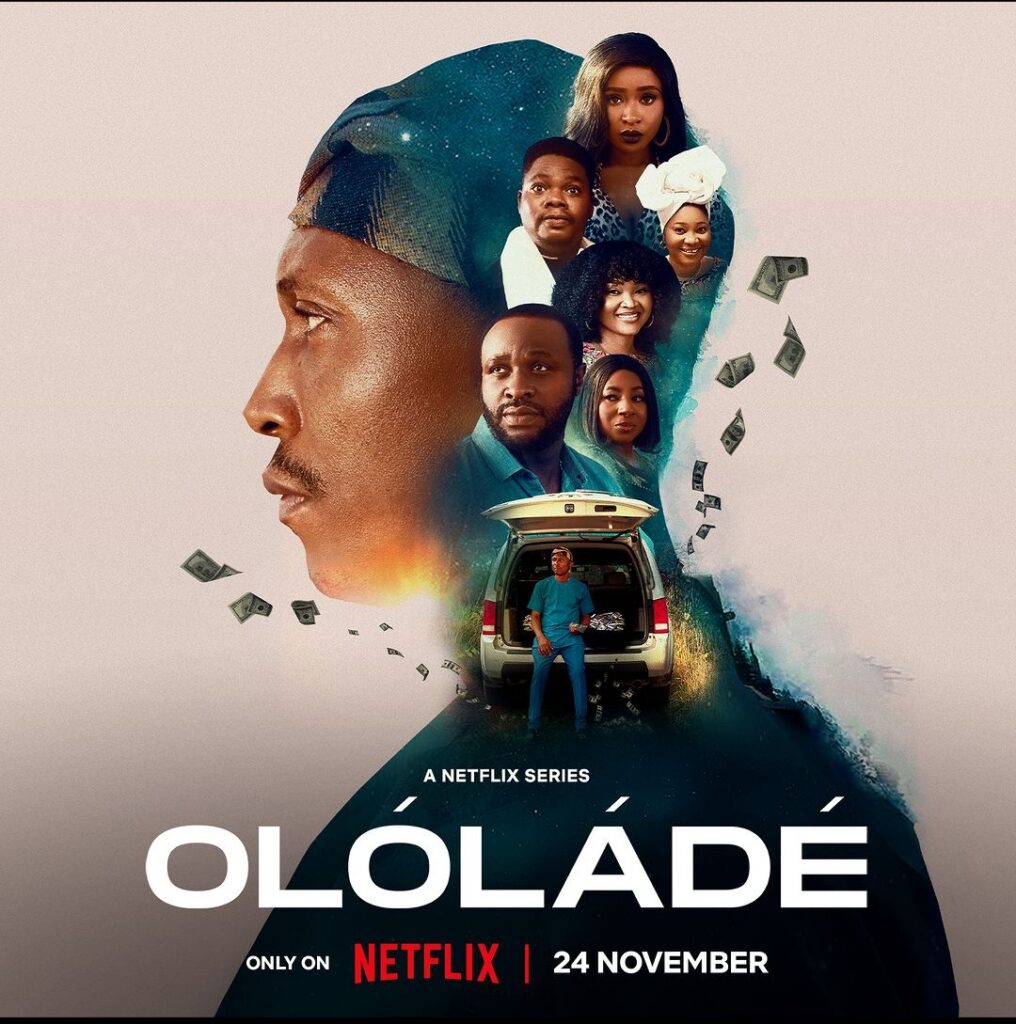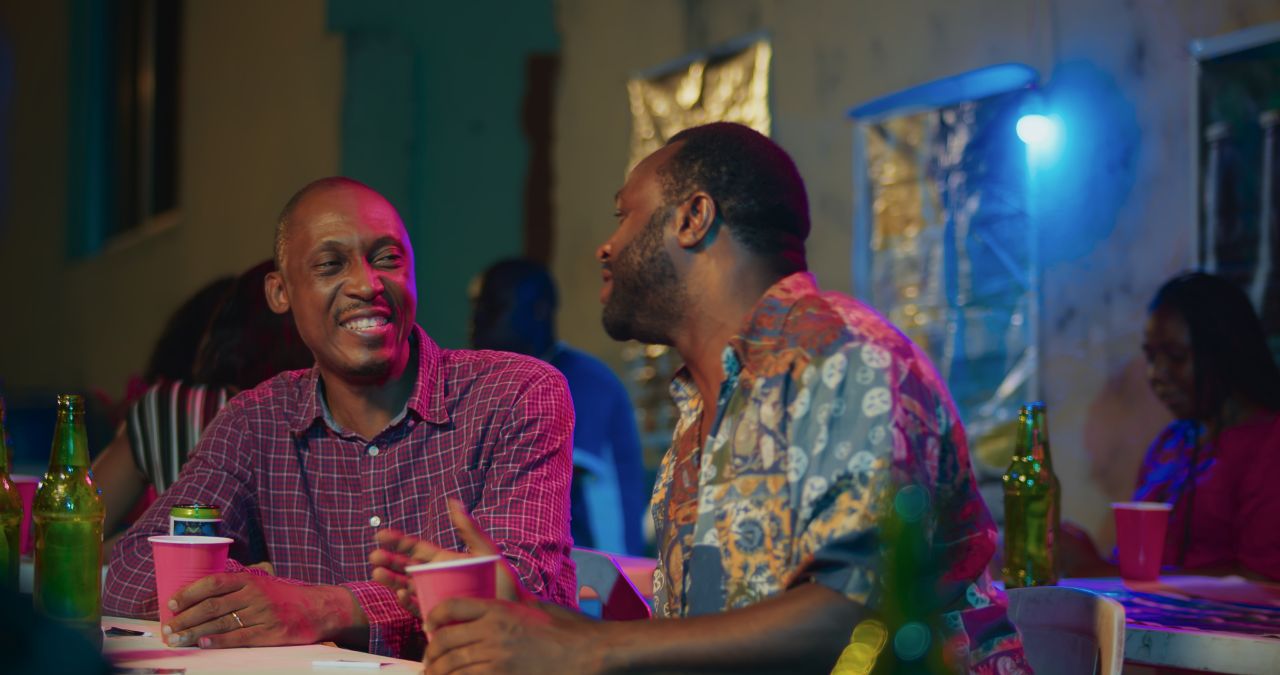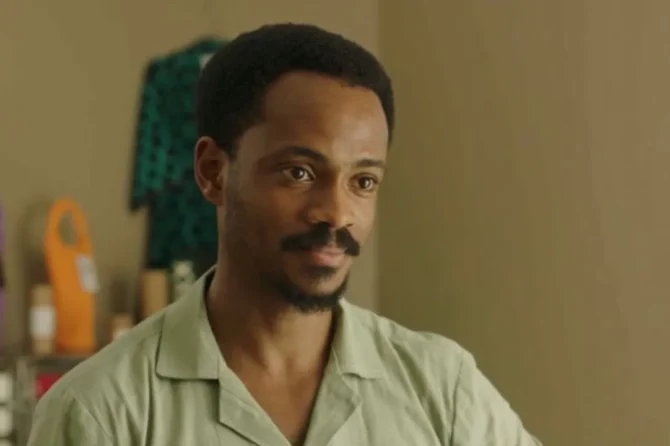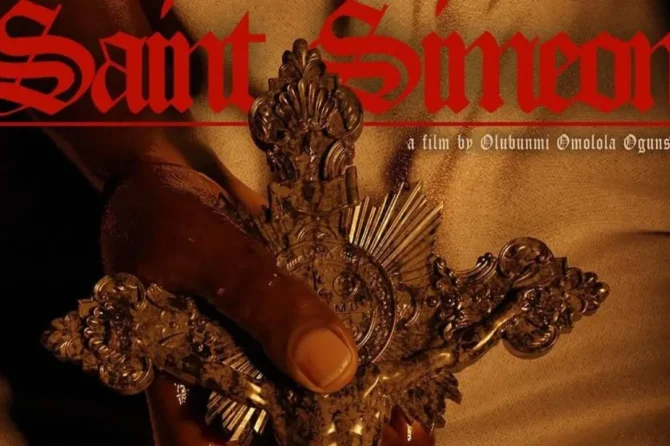Ololade opens with a morbid premise. It is a scene that’d set a tone for any viewer. Two figures shrouded in darkness and accompanied by an eerie soundtrack are digging a shallow grave. They pick a corpse and toss it into the grave. Then, we cut to the title card. One expects several things from the series with that opener: mystery, thrill perhaps, crime, definitely, and most importantly, a clever plot. As the series unfolds, it quickly becomes clear that Ololade doesn’t have the gravitas to deliver on all fronts.

Ololade is a 6-episode Netflix-acquired original series with Lani Aisida as Head Writer, and Adeniyi Joseph-Omobulejo as the director. The series stars Femi Adebayo (Lateef) and Frank Donga (Shina) as two friends who have simultaneously come upon a huge amount of wealth under nefarious circumstances. Wealth changes their lives dramatically, but it also complicates it. When justice from their pasts comes calling, it finds them both wanting.
Lateef is a crass auto-mechanic, and Shina is a schoolteacher. Both of them are chronic philanderers, although Shina is subtler on account of having a wife and child. Their respective womanizing behaviour is the impetus for the inciting incident. Lateef finds himself in trouble after a lover of his, Laide (Ololade Shomala), dies at the hands of his other lover. He keeps her secret, and she pays him off handsomely as a reward. Lateef’s friend, Shina, finds himself 50 million naira richer after a mix-up occurs while flirting with a woman on a bank run. The inciting incident is fascinating because of how believable it is. But everything afterward is highly questionable and casts a looming shadow of narrative inefficiency on the series.
Ololade is a throwback to old Nollywood. The preoccupation with poverty and instant wealth from mysterious sources is reminiscent of Yoruba Nollywood films about money rituals. Only in this case, the source, particularly with Shina, is modern. So we have a film with an ethical question about fornication and philandering and a thematic concept of mysterious wealth and its consequences. Ololade tries, but it does not realize its narrative potential. Produced by TNC Africa, the filmmakers knew what they had at hand and what they wanted to do with it but simply did not achieve it.
While they wanted to take a modern twist to an old theme, there is no proper ingenuity around their take for us to confidently accept that they’ve done something unique. And while the story would have sufficed itself, there are so many decisions the characters make that one questions their plausibility. By the third episode, it becomes evident that the characters are making decisions only at the convenience of pushing the plot forward. An example is half of Lateef’s decisions after he buries Laide (Ololade Shomala). Maybe don’t propose to the best friend of the woman you have just buried; maybe don’t live in the same town after it’s clear you can afford to move; maybe don’t visit the parents of your victim; maybe don’t a whole lot of other things Lateef did. It is incredible how a character can be so selfish and guilty as Lateef. He had the potential to be a very complex character, but there was no real mirror-on-the-wall moment for him. A scene where he properly sits alone and reflects on his decisions and who he really is. That lack of well-made reflection holds his character growth back. And the same questions can be directed at Shina. Why, for example, is he such a passenger in the story?
There is no reason in Ololade, none at all, for Lateef to be an auto-mechanic. So why is he one? There is no genuine justification for two or three recurring characters. Bose (Damilola Oni) and Dayo (Oluwatobi Olubiyi aka Oli Ekun) are superfluous luxury characters. The story holds properly with its ethical questions intact without them. Ololade not only disregards Chekhov’s gun, but the series shoots itself in the foot with it. Because if Lateef is an auto-mechanic, it has to pay off at some point in the series, and it never does. If Lateef is a chronic gambler, where does that gambling addiction lead him? To what effect does it shape how they operated as a phoney betting outfit?
We might not be erring if we put some blame on the acting. The acting offers the bare minimum. The capable performances of some actors are cancelled out by the excessive and subpar performances of other actors. On a general note, the performances are mediocre. These are roles we have seen before, and none of the actors bring anything original to their characters. Frank Donga’s acting is tired and languid, like the comic characters he became popular for. Mide Martins (Sade), who plays his wife, has the most measured performance in the series, and it doesn’t feel like she left second gear. Damilola Oni plays a crass noisemaker which becomes annoying because of how surplus she is to narrative requirements. An unhealthy predictability accompanies the acting, such that even in high-tension scenes, the viewer feels nothing. It might indicate problematic pacing that lags; in truth, each 40-odd-minute episode could have ended some minutes earlier.
What do we praise about this work? As always, effort. The series has some good lighting scenes; the opening is a good example. There is also genuine promise in Ololade’s premise. It manages to balance humour and seriousness in some scenes. And the situation lends itself to real, high-stakes drama. It is a work that, with several different decisions, could have been rescued into excellence.
Ololade premiered on November 24, 2023, on Netflix.
Join the conversation in the comments section or on Twitter.
Sign Up: Keep track of upcoming films and TV shows on your Google calendar.
Side Musings
- Sometimes, you can’t unsee Frank Donga. The scene in which he encounters the villain ends up funny, even though it should be terrifying.
- What a lacklustre villain. By the time she actually does something terrifying, it is too late. We have already formed an opinion about her.
- It is Day Uncountable, and I am still campaigning that we don’t automatically assume influencers can act.








the movie did some great tbings write about that
You could also do that here in the comments. Please, don’t hesitate.
The story was just messy. I actually didn’t like Frank and Ihotu’s acting. It was bad. Risi’s yoruba wasn’t it at all. Thumb up to the production team.